Strong judicial showing secures Scandi-Baltic influence at the UPC
Despite a promising start, the number of UPC cases filed in Copenhagen, Helsinki and Stockholm remains low. But with three first-instance divisions and five legally qualified judges, the region still has a strong presence in Europe's new patent system. Here, JUVE Patent presents judges Peter Agergaard, Stefan Johansson, Kai Härmand, Petri Rinkinen and Ingeborg Simonsson – as well as Alexander Ramsay, first registrar of the Unified Patent Court.
6 May 2024 by Mathieu Klos
It is spring, and the beech trees are growing high into the bright blue sky over Scandinavia. But the number of UPC cases pending at the region’s three UPC courts are maturing less rapidly than their initial buds suggested. Parties have filed just nine infringement and PI cases at the Copenhagen and Helsinki local divisions, and the Nordic-Baltic regional division in Stockholm, since June 2023. By comparison, according to the statistics released by the UPC at the end of April, the Munich local division has had 46 infringement and 12 PI proceedings.
Nevertheless, the UPC system offers a strong representation for Scandinavia: Helsinki, Copenhagen and Stockholm provide three UPC divisions in the first instance, while the percentage of technically qualified judges from Denmark, Finland and Sweden is greater than that of legally qualified judges (see graphic below). Furthermore, with judge Ingeborg Simonsson, Sweden provides a Court of Appeal judge and a member of the UPC’s Presidium.
Alexander Ramsay may not be a UPC judge, but the Swedish native also holds an important position as registrar. He is not involved in judgments but rather makes far-reaching organisational decisions to ensure smooth functioning of the court. Even before his appointment as registrar, the former patent judge was already an influential figure at the UPC, involved in its preparations since 2008. As Administrative Committee chairman, Ramsay played a decisive role in the final preparations for the UPC’s launch. Yet another strong showing for Scandinavia.
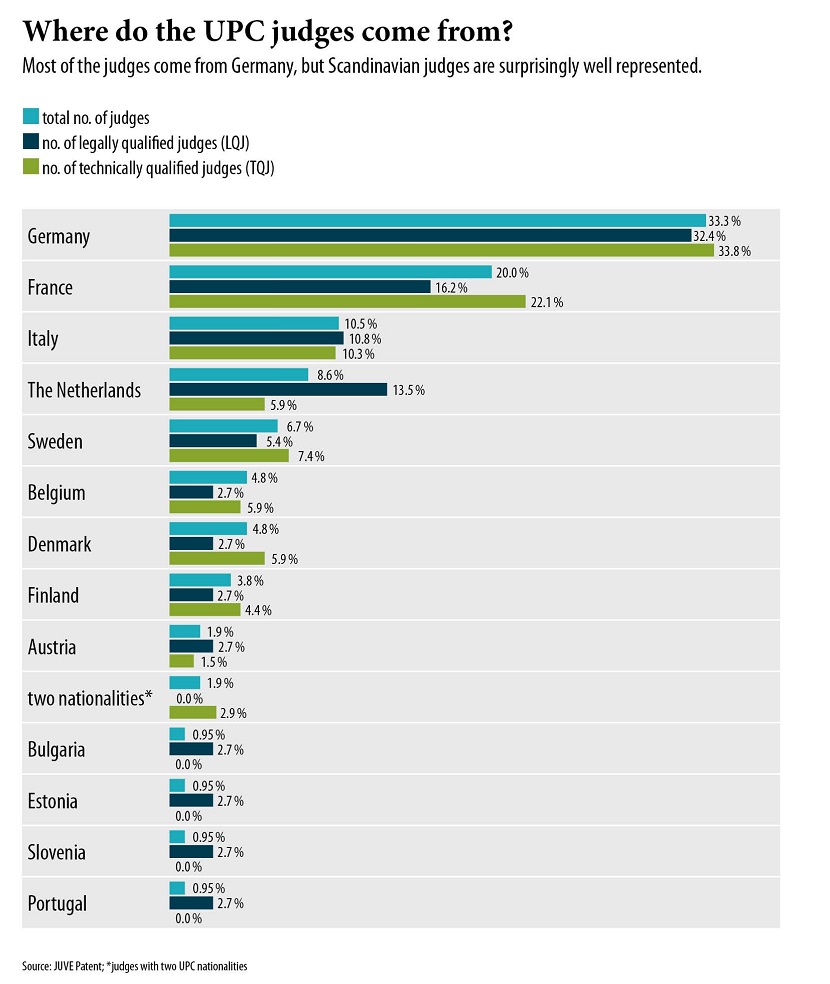
Furthermore, court users clearly consider Scandinavia’s judges to have extensive technical competence and a good service mentality. Users, especially those from the UK, often refer to the Scandinavian UPC courts as an ‘insiders’ tip’ because of the judges’ high technical competence and English language skills.
Fruitful start for Scandinavia
In summer 2023, the Nordic-Baltic regional division made a fruitful start. On the first day of operation, Ocado filed a now-settled lawsuit against Autostore, while Edwards Lifesciences attacked arch-rival, Meril Life Sciences. Both parties also filed claims with other UPC divisions.
In July, the Helsinki local division also received its first case after AIM Sport filed an infringement and PI case against Supponor. Like the two actions brought by Ocado and Edwards Lifesciences in Stockholm, this dispute extended previous national litigation.
On the other hand, the Copenhagen local division waited until 2024 for its first case. Despite the request of JUVE Patent, the court did not provide any details on this case. But, since the promising start, cases at the other two Scandinavian UPC divisions in Stockholm and Helsinki have only slowly trickled in.
Stable case numbers nationally
Scandinavian lawyers are used to low case numbers compared to Germany, France or the UK. According to Swedish lawyers, on average around 20 new cases per year have reached Sweden’s first-instance court in recent years. The Sweden Patent and Market Court informed JUVE Patent that it presided over just 12 cases overall in 2023.
The situation in Finland is similar. The Market Court in Helsinki, which is the first instance for patent proceedings, received 20 new cases in 2023. However, the court numbers for both courts do not include appeals against decisions of the respective patent offices, with the Helsinki and Stockholm courts both also responsible for such cases. JUVE Patent does not have figures for national patent proceedings in Denmark, which are conducted at the Maritime and Commercial High Court. However, experts estimate that the numbers do not exceed the figures for patent cases at the Stockholm and Helsinki courts.
Nevertheless, their European colleagues consider patent judges from the Scandinavian countries to be very competent. They are already accustomed to the norm at the UPC, which examines infringement and invalidity together. Thus, the Scandinavian judges did not have to adjust to a new system like their German colleagues, who are used to bifurcation.
“The judges want the system to work”
With patent law in Finland mostly concluding at the first instance, the judges of the Market Court in Helsinki have a particularly good reputation among users.
Henri Kaikkonen, partner at the Helsinki office of Bird & Bird, says, “The Finnish patent system has only one instance, because only very rarely is leave to appeal granted. Because there is no review by the second instance in most cases, actions are discussed and scrutinised very intensively at first instance. This requires specialised and experienced patent judges. One advantage of this system is that the proceedings are very straightforward and fast.”
So far, Petri Rinkinen is the UPC’s only Finnish judge. But the court’s users, especially Scandinavian lawyers, also praise the other four legally qualified judges who hail from the region. Johanna Flythström, partner at Roschier, says, “The judges very much want the system to work well and are very diligent and active across the board. The Nordic UPC judges can bring in their experience which combines elements also from the traditions of some of the larger European jurisdictions.”
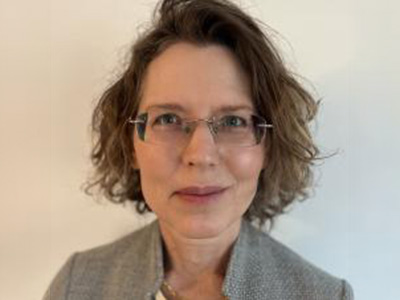
Ingeborg Simonsson
Ingeborg Simonsson, court of appeal judge
Swedish judge Ingeborg Simonsson is probably the most influential of the Scandinavian UPC judges. Together with Rian Kalden and Patricia Rombach, Simonsson is a member of both the court of appeal’s second panel and the UPC presidium. As such, Simonsson is in the control centre of the new court.
Lawyers describe the judge as “very good, calm and friendly, but also creative”. They attribute the latter to the Swede’s academic career: before becoming a judge, Ingeborg Simonsson was a full-time researcher and teacher at Stockholm University. In 2009, she gained a doctorate in European law.
Aside from her academic credentials, Simonsson has been a full-time judge in Sweden since 2008. Here, she works on all types of patent cases, as well as intellectual property law and in civil litigation. And, during her career, Ingeborg Simonsson has also worked extensively in competition law.
In 2020, the Swedish Court of Appeal and the Patent and Market Court of Appeal appointed her as a judge. At the UPC, she was involved in the court of appeal ruling that dismissed Ocado’s appeal against public access to documents and also in the first UPC Court of Appeal decision clarifying the deadline for defendants.
Stefan Johansson, presiding judge, Nordic-Baltic regional division
Stefan Johansson is the second prominent Swedish judge in the system. He leads the UPC Nordic-Baltic regional division, which covers Sweden and the three Baltic states of Estonia, Latvia and Lithuania. It is currently the supranational court’s only regional division.
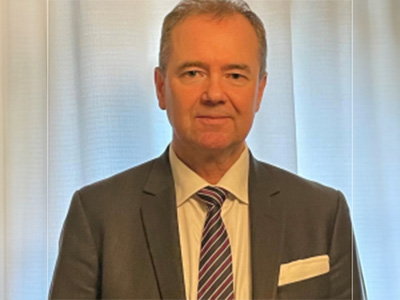
Stefan Johansson
Patent experts describe Johansson as a “very good and level-headed judge”. Parallel to his UPC job, he is currently also a senior judge at Stockholm District Court, where he currently works as a head of division. Before Johansson joined the Stockholm District Court, he worked for almost eleven years at the Swedish Ministry of Justice in the division dealing with intellectual property rights.
However, unlike Petri Rinkinen or Peter Agergaard who head the Helsinki and Copenhagen local divisions, JUVE Patent research shows that Johansson is currently only involved in UPC cases filed at the Nordic-Baltic regional division. These include Edwards Lifesciences’ two attacks against Meril Life Sciences over heart valves, and a case filed by Abbott against Dexcom over glucose-monitoring devices.
In January 2024, Texport filed a lawsuit concerning protective clothing against Sioen. Furthermore, on 16 April the Norwegian company Viking Arm filed a patent infringement action in Stockholm against Stanley Black & Decker. The action relates to an ongoing infringement of Viking Arm’s EP 3 953 541 (case ID: ACT_19392/2024).
Kai Härmand, judge, Nordic-Baltic regional division
Estonian Kai Härmand is the second permanent judge at the Nordic-Baltic regional division. Like Stefan Johansson, she is currently only involved in the UPC cases pending before this division. JUVE Patent has less information about Härmand, while the volume of patent litigation in her home country is limited.
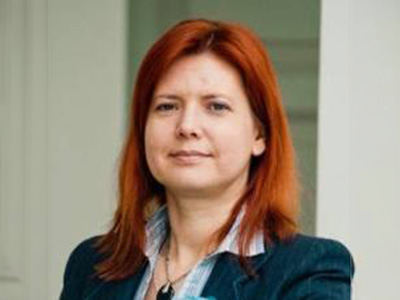
Kai Harmand
Parallel to the UPC, Kai Härmand has been a judge at the Harju County Court since 2020. Prior to this, she was deputy secretary general at the Estonian Ministry of Justice and a legal adviser at the Estonian Patent Office. Between 2006 and 2014, Härmand was a legally qualified member of the EPO’s Enlarged Board of Appeal.
Petri Rinkinen, presiding judge, Helsinki local division
Lawyers say Finnish judge Petri Rinkinen is well-versed in patent law and the “right choice for the Finnish local division”. Since 1997, he has focused on intellectual property law matters, first gaining experience as a lawyer at Finnish law firms, including Castrén & Snellman.
Petri Rinkinen has been a judge at the Finnish Market Court in Helsinki since 2013. Since last June, he has also headed the Helsinki local division, which had two early cases after AIM Sport filed an infringement and PI case against Supponor regarding advertising technology in sports stadiums. Initially AIM Sport had opted out the claimed patent of the UPC, subsequently deciding to withdraw the opt-out and file the cases in Helsinki.
In September 2023, in PI proceedings the Helsinki local division rejected both claims by AIM Sport. An appeal is pending. However, in the official statistics, the PI case is attributed to the Court of Appeal. With reference to the 2022 German proceedings, the Helsinki judges ruled that AIM Sport could not have withdrawn the opt-out. Therefore, the court dismissed the plaintiff’s application and the merits action. AIM Sports’ appeal is currently pending at the UPC Court of Appeal.
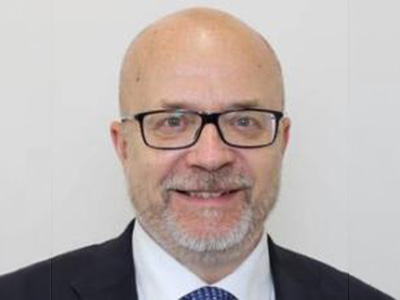
Petri Rinkinen
But despite there being no active case in Helsinki, Rinkinen is by no means twiddling his thumbs. As a foreign judge, he is involved in several cases at other local divisions.
This includes two PI cases brought by Abbott Diabetes Care against SiBio Technology and distribution partner Umedwings at The Hague’s local division over glucose-monitoring devices.
In two similar cases, Rinkinen will rule on the dispute between Dexcom and Abbott at the Düsseldorf local division. He will also preside over a mobile phone patent cases at the Hamburg local division and a case in Munich concerning the infringement of a patent for a urinary catheter.
Peter Agergaard, presiding judge, Copenhagen local division
Of all the judges from Scandinavia, it is perhaps Rinkinen with the most technical scope among his cases. But Peter Agergaard, presiding judge of the Copenhagen local division, has a similar workload. The Copenhagen local division currently has one infringement case. Nevertheless, Agergaard is not without work, as he is frequently called in as an foreign judge at other local divisions.
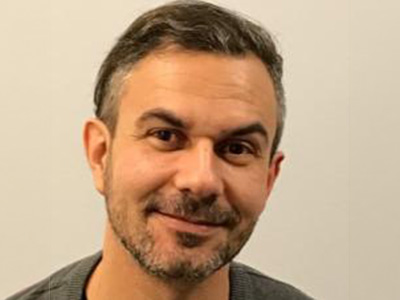
Peter Agergaard
For example, he sits on the Munich local division panel in the dispute between Abbott and Dexcom. At the Düsseldorf local division, he is adjudicating in a case between N.V. Nutricia and Nestle over a food patent. Also in Düsseldorf , he is involved in the case between Tridonic and Cupower concerning lightning technology.
The dispute between FujiFilm and Kodak before the Mannheim local division concerns printing technology and in two other cases mobile communication and semiconductors patents are in dispute.
At the Düsseldorf local division, the NPE Headwater Research sued Samsung Electronics and at the Hamburg local division, the NPE Lionra Technologies is taking action against Cisco.
Probably because the Copenhagen local division only recently received its first case, Peter Agergaard has so far flown under the radar. However, while little is known about the Danish IP judge, patent experts in his country view him as highly experienced. He began his professional career in the Danish administration and, in 2016, the Western High Court in Denmark appointed him as acting judge. Agergaard moved to the Maritime and Commercial Court a year later, which appointed him as a permanent judge in 2020.
Alexander Ramsay, first UPC registrar
In January 2023, the UPC presidium appointed Alexander Ramsay as its registrar. Only three months before, in November 2022, Ramsay left his role as UPC Administrative Committee chairman.
He had a decisive influence on the court’s creation for 14 years. As early as 2008, Alexander Ramsay was involved in the preparations for the UPC, becoming vice chairman of the Preparatory Committee in 2013. From 2015, he led court preparations from this role. In January 2022, the Administrative Committee replaced the Preparatory Committee.

Alexander Ramsey
At the time, observers considered the decision to appoint Ramsay as registrar as the next most important appointment after that of the UPC judges in October 2022. The registrar organises all of the court proceedings and leads the court registry.
According to the UPC website, some of the registrar’s duties include:
- Organising court proceedings and keeping the register, including records of all cases before the court;
- Maintaining the court’s IT system;
- Assisting the presidium in preparation and implementation of the court’s budget.
For many years, Ramsay was the public face of the UPC. Judges such as Matthias Zigann, Klaus Grabinksi and Rian Kalden have since taken over this role, but the affable Swede remains one of the new court’s most accomplished insiders and an influential behind-the-scenes string-puller.
TQJs from Scandinavia
Overall, eleven technically qualified judges complete the strong list of UPC Scandinavian judges, with five judges specialising in chemistry and pharmaceuticals. Denmark and Sweden in particular have a strong life sciences industry with many start-ups. In addition, Sweden’s AstraZeneca and Denmark’s Novo Nordisc are among the 20 largest pharmaceutical companies in the world. The national patent courts in Copenhagen, Helsinki and Stockholm are dominated by litigation involving traditional pharmaceuticals and biologics.
Of the eleven judges, eight were either full-time judges at their national courts before the UPC appointment or are now part-time UPC technical judges.
Chemistry and pharmaceuticals
- Andreas Gustafsson – Sweden; judge at the Patent and Market Court, Stockholm District Court
- Anna Hedberg – Sweden; judge at the Patent and Market Court, Stockholm District Court
- John Meidahl Petersen – Denmark; in-house patent attorney at Lundbeck
- Casper Struve – Denmark; patent attorney at Zacco (also TQJ at the Danish Maritime and Commercial High Court)
- Steen Wadskov-Hansen – Denmark; patent attorney at Budde Schou
Electricity
- Simon Walker – Finland; in-house patent attorney at Nokia
Mechanical engineering
- Claus Elmeros – Denmark; patent attorney at Plougmann Vingtoft (also TQJ at the Danish Maritime and Commercial High Court)
- Merja Annikki Heikkinen-Keinänen – Finland; technical judge at the Market Court of Finland
- Kerstin Roselinger – Sweden; technical judge at the Patent and Market Court, Stockholm District Court
Physics
- Anders Hansson – Sweden; patent attorney at Kransell & Wennborg (also part-time judge at the Patent and Market Court Stockholm, 1st and 2nd instance)
- Patrik Rydman – Sweden; judge at the Swedish Patent and Market Court, Stockholm
All photos ©Unified Patent Court

